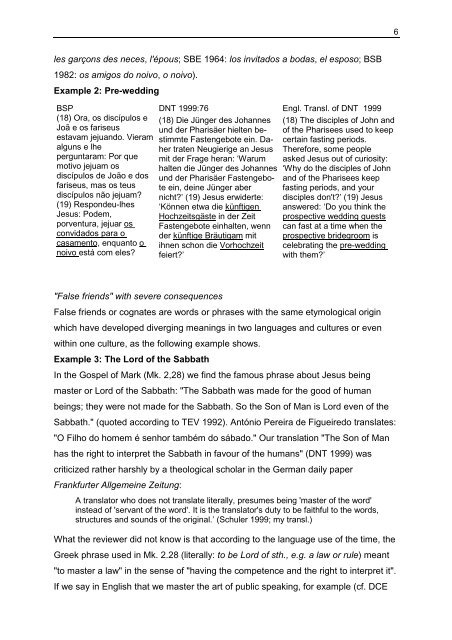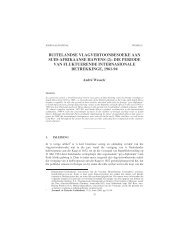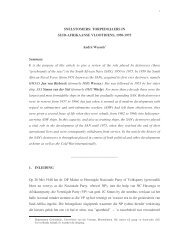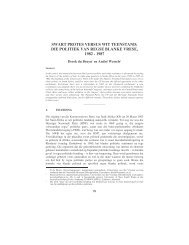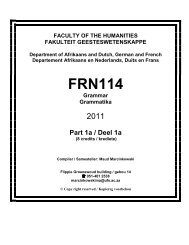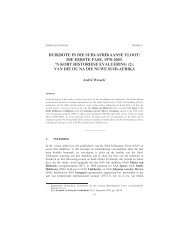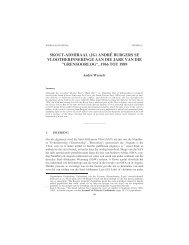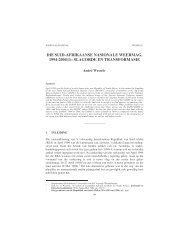Function plus Loyalty: Ethics in Professional Translation
Function plus Loyalty: Ethics in Professional Translation
Function plus Loyalty: Ethics in Professional Translation
Create successful ePaper yourself
Turn your PDF publications into a flip-book with our unique Google optimized e-Paper software.
les garçons des neces, l'épous; SBE 1964: los <strong>in</strong>vitados a bodas, el esposo; BSB<br />
1982: os amigos do noivo, o noivo).<br />
Example 2: Pre-wedd<strong>in</strong>g<br />
BSP DNT 1999:76 Engl. Transl. of DNT 1999<br />
(18) Ora, os discípulos e<br />
Joã e os fariseus<br />
estavam jejuando. Vieram<br />
alguns e lhe<br />
perguntaram: Por que<br />
motivo jejuam os<br />
discípulos de João e dos<br />
fariseus, mas os teus<br />
discípulos não jejuam?<br />
(19) Respondeu-lhes<br />
Jesus: Podem,<br />
porventura, jejuar os<br />
convidados para o<br />
casamento, enquanto o<br />
noivo está com eles?<br />
(18) Die Jünger des Johannes<br />
und der Pharisäer hielten bestimmte<br />
Fastengebote e<strong>in</strong>. Daher<br />
traten Neugierige an Jesus<br />
mit der Frage heran: ‘Warum<br />
halten die Jünger des Johannes<br />
und der Pharisäer Fastengebote<br />
e<strong>in</strong>, de<strong>in</strong>e Jünger aber<br />
nicht?’ (19) Jesus erwiderte:<br />
‘Können etwa die künftigen<br />
Hochzeitsgäste <strong>in</strong> der Zeit<br />
Fastengebote e<strong>in</strong>halten, wenn<br />
der künftige Bräutigam mit<br />
ihnen schon die Vorhochzeit<br />
feiert?’<br />
"False friends" with severe consequences<br />
(18) The disciples of John and<br />
of the Pharisees used to keep<br />
certa<strong>in</strong> fast<strong>in</strong>g periods.<br />
Therefore, some people<br />
asked Jesus out of curiosity:<br />
‘Why do the disciples of John<br />
and of the Pharisees keep<br />
fast<strong>in</strong>g periods, and your<br />
disciples don't?’ (19) Jesus<br />
answered: ‘Do you th<strong>in</strong>k the<br />
prospective wedd<strong>in</strong>g guests<br />
can fast at a time when the<br />
prospective bridegroom is<br />
celebrat<strong>in</strong>g the pre-wedd<strong>in</strong>g<br />
with them?’<br />
False friends or cognates are words or phrases with the same etymological orig<strong>in</strong><br />
which have developed diverg<strong>in</strong>g mean<strong>in</strong>gs <strong>in</strong> two languages and cultures or even<br />
with<strong>in</strong> one culture, as the follow<strong>in</strong>g example shows.<br />
Example 3: The Lord of the Sabbath<br />
In the Gospel of Mark (Mk. 2,28) we f<strong>in</strong>d the famous phrase about Jesus be<strong>in</strong>g<br />
master or Lord of the Sabbath: "The Sabbath was made for the good of human<br />
be<strong>in</strong>gs; they were not made for the Sabbath. So the Son of Man is Lord even of the<br />
Sabbath." (quoted accord<strong>in</strong>g to TEV 1992). António Pereira de Figueiredo translates:<br />
"O Filho do homem é senhor também do sábado." Our translation "The Son of Man<br />
has the right to <strong>in</strong>terpret the Sabbath <strong>in</strong> favour of the humans" (DNT 1999) was<br />
criticized rather harshly by a theological scholar <strong>in</strong> the German daily paper<br />
Frankfurter Allgeme<strong>in</strong>e Zeitung:<br />
A translator who does not translate literally, presumes be<strong>in</strong>g 'master of the word'<br />
<strong>in</strong>stead of 'servant of the word'. It is the translator's duty to be faithful to the words,<br />
structures and sounds of the orig<strong>in</strong>al.’ (Schuler 1999; my transl.)<br />
What the reviewer did not know is that accord<strong>in</strong>g to the language use of the time, the<br />
Greek phrase used <strong>in</strong> Mk. 2.28 (literally: to be Lord of sth., e.g. a law or rule) meant<br />
"to master a law" <strong>in</strong> the sense of "hav<strong>in</strong>g the competence and the right to <strong>in</strong>terpret it".<br />
If we say <strong>in</strong> English that we master the art of public speak<strong>in</strong>g, for example (cf. DCE<br />
6


